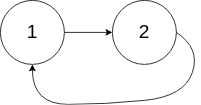141. Linked List Cycle
Tags: ‘Linked List’, ‘Two Pointers’
Given a linked list, determine if it has a cycle in it.
To represent a cycle in the given linked list, we use an integer pos which represents the position (0-indexed) in the linked list where tail connects to. If pos is -1, then there is no cycle in the linked list.
Example 1:
Input: head = [3,2,0,-4], pos = 1 Output: true Explanation: There is a cycle in the linked list, where tail connects to the second node.

Example 2:
Input: head = [1,2], pos = 0 Output: true Explanation: There is a cycle in the linked list, where tail connects to the first node.

Example 3:
Input: head = [1], pos = -1 Output: false Explanation: There is no cycle in the linked list.

Follow up:
Can you solve it using O(1) (i.e. constant) memory?
Solution
- Using Hashtable. O(n) time O(n) space.
- Two pointers ```java // 100% 84% public boolean hasCycle(ListNode head) { if (head == null || head.next == null) { return false; // deal with corner case FIRST } ListNode slow = head, fast = head.next; while (slow != fast) { if (fast == null || fast.next == null) { return false; } slow = slow.next; fast = fast.next.next; } return true; }
// Reverse condition, same performance public boolean hasCycle(ListNode head) { if (head == null || head.next == null) { return false; // deal with corner case FIRST } ListNode slow = head, fast = head.next; while (fast != null && fast.next != null) { if (slow == fast) { return true; } slow = slow.next; fast = fast.next.next; } return false; }
```